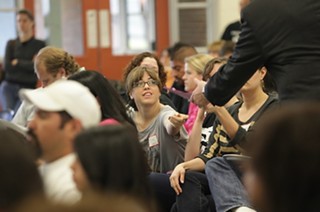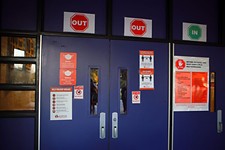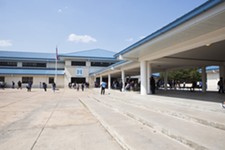Eastside Community Hears National Partner Proposals
Major ed groups pitch plans to work with, not take over, high school
By Richard Whittaker, 1:58PM, Mon. Apr. 22, 2013

Advise, not govern. Support, not supplant. Those were the cornerstones of the pitches from two nation educational groups on Saturday to the Eastside Memorial High School Community as Austin ISD pushes on with the hunt for a partner in the school
Partner is the key word. Last year, the AISD trustees cancelled their contract with IDEA Public Schools when voters rejected their hamfisted attempt to take over the Eastside Vertical Team. However, Commissioner of Education Michael Williams says the school still needs an external partner to fulfill their 2013 School Reconstitution Plan and the 2011 School Improvement Plan. Worse, Williams only gave them until the end of May to present a proposal and, if he approves their selection, the program would have to be in place for the 2013-14 school year, starting this September.
There were concerns that the accelerated timeline would make the RFP process hard. However, the local community and education advocates spread the word: Five groups applied, and the short list comprises two nationally recognized groups: The Johns Hopkins School of Education, and the American Institutes for Research.
In a well-attended community meeting in the Eastside cafeteria on April 20, the two entities laid out their pitches for the campus. Moderated by Austin Voices in Education director Allen Weeks, the event gave each group half an hour to present, followed by a 45 minute Q&A. Both groups emphasize that they are proposing a partnership, not a charter-style take-over (Johns Hopkins even stressed that teachers will not be forced to re-apply for their jobs). AIR's Cary Cuiccio said that her group wanted to create "an educational ecosystem" that depended on collaboration. She added, "There's no way we could just drop ourselves into an environment like this. If the web is strong, we bounce back out. If the web is weak, then we drop right through."
Both made one clear statement: That they would be there for as long as they were needed, and no longer. Chris Caesar, an instructional facilitator with Johns Hopkins and a former Texas teacher who grew up in East Austin, said, "We're not interested in taking over Eastside High. We like to help, we like to work, and we like to move on." If they do the job right, he said, they should be out in three to five years. However, the processes they put in place should work long after they are gone.
Neither group has a plan, per se: Instead, what the district evaluation committee will discuss tonight and every night this week until they make a recommendation, is a process to evaluate what the campus wants and needs. They will need to work out who can hit the ground running fastest, most effectively, and deliver what the campus requires: They will then send their proposal to the administration, which will send it to the board of trustees. If they like what they see, they could vote on a proposal as early as May 6 or as late as May 13, and then hand it on to Williams for final approval.
Johns Hopkins University Talent Development Secondary
Who They Are While for most Johns Hopkins is synonymous with medicine, its School of Education has been engaged in school turnaround for the last two decades. The core, according to Regional Site Manager Jeffrey Robertson, are three indicators that a child will fail are there in sixth grade. Johns Hopkins calls them them the ABCs:
A is for poor attendance
B is for disruptive behavior
And C is for course failure in Math or English.
Any one indicator means a child's chances of graduating drop to 10% to 15%.
Regional Site Manager Jeffrey Robinson argued that creating community within the school to deal with the ABCs was key. He said, "We take a team of teachers and connect them with a cohort of kids." The emphasis is on individual contact, adding resources to support struggling kids so not only can they pass, but they don't distract and disrupt the teaching process, dragging the rest of the class down.
What They're Proposing: The Johns Hopkins program is called Talent Development Secondary, and their staff would assist in curriculum development, teacher training, support staff such as social workers, and the use of young adults to work as mentors. The main point of contact would be a field manager, who would work with the principal to find the gaps and work out how to maximize resources.
The day would be structured around "double-dose" courses, putting extra emphasis on the base skills to prevent drop-out. As kids become stronger in those areas, they will have more opportunities to diversify and take electives. The daily structure also allows teachers to become better engaged with each student. Take the traditional 4x4 day: If a teacher has four classes with 30 to 25 kids per class, they're seeing 120-140 kids daily. Small learning communities with three teaching periods, still with 30-35 kids, cut that to daily contact to 90-105. That small change means a better chance for each teacher to know who all their kids are, and where the issues lie. In fact, one of the first things Johns Hopkins does is sit down with a list of every student, and get every teacher to mark which ones they know and what they know about them. That should provide some pretty valuable baseline data to kick off the school year.
Robinson stressed that this is not just about supporting under-achievers, but also fast-tracking the large percentage of kids coming in above grade level. They should metriculate out of the double-dose courses fast, at which point Johns Hopkins will have provided scheduling experts to work with campus staff, to provide more alternatives.
You can read the Johns Hopkins proposal on the AISD website in English and Spanish.
American Institutes for Research
Who They Are By comparison to Johns Hopkins, AIR is a relative newcomer to hands-on school turnaround. Traditionally, their skill set has been as a consultant, making structural recommendations on how to fix institutions (their client list has stretched from the US Government to Verizon and the Simon Wiesenthal Center). On the ground, they would be assisted in Austin by the locally-based Gibson Consulting Group, which specializes in analysis and consultation for educators, and has previously been hired by dozens of Texas ISDs.
What They're Proposing While both pitches stressed community outreach and a bespoke approach to problem-solving, AIR's proposal placed greatest emphasis on the initial outreach phase. Over six months, they would find out exactly what the problems are, and what the community wants. In that period, the school would develop strategy of going out and meeting every parent, guardian or caregiver at least once. "The school goes to the community," she said, "the community does not go to the school." This may not always home, since some parents may not want a home visit, so they would have to be organized at the parent's convenience.
The outreach would go on beyond that initial period. Cuicco described a school-community council and family visits "non-negotiable", while presenting a shopping list of other desirables, such as a family support coordinator, family nights, and family resource news. Part of the battle would be about good press, and spreading the success stories after years of negativity around the campus. She gave the example of East Middle School in Hazelwood, Miss. Before the beginning of the school year, AIR and school staff went out to families and gave them took them backpacks, sponsored by local businesses and carrying the East Middle logo. She said, "They made a connection before school started."
You can read the AIR proposal on the AISD website here.
Got something to say on the subject? Send a letter to the editor.
A note to readers: Bold and uncensored, The Austin Chronicle has been Austin’s independent news source for over 40 years, expressing the community’s political and environmental concerns and supporting its active cultural scene. Now more than ever, we need your support to continue supplying Austin with independent, free press. If real news is important to you, please consider making a donation of $5, $10 or whatever you can afford, to help keep our journalism on stands.
Morgan O’Hanlon, May 22, 2022
Clara Ence Morse, July 7, 2021
Beth Sullivan, Dec. 31, 2020
Kimberley Jones, July 14, 2020
April 20, 2024
April 19, 2024
Austin ISD, AISD, Meria Carstarphen, Jayme Mathias, Eastside Memorial, EMHS, Vertical Team, Allen Weeks, Johns Hopkins University, Talent Development Secondary, American Institutes for Research, AIR












